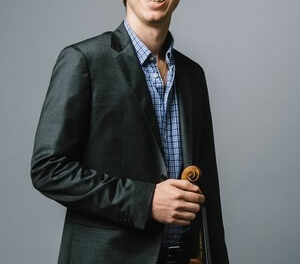This preview has been provided by the North Carolina Symphony.
The North Carolina Symphony, led by guest conductor Andrew Grams, will perform Camille Saint-Saëns’ “Organ” Symphony on Friday, Feb. 26, and Saturday, Feb. 27, at 8 p.m. in Raleigh’s Meymandi Concert Hall. The performances will also feature two selections from César Franck’s Psyché, and “Six épigraphes antiques” and “Prelude to the Afternoon of a Faun” by Claude Debussy.
With a unique combination of intensity, enthusiasm and technical clarity, American conductor Andrew Grams has steadily built a reputation for his dynamic concerts and long-term orchestra building. Mr. Grams has led orchestras throughout the United States including The Philadelphia Orchestra, Chicago Symphony, Detroit Symphony, National Symphony Orchestra, St. Louis Symphony, and the Houston Symphony. He served as Assistant Conductor of The Cleveland Orchestra from 2004-2007 where he worked under the guidance of Franz Welser-Möst, and has since returned for several engagements. Mr. Grams is in his third season as Music Director of the Elgin Symphony Orchestra.
Organist and North Carolina native David Jernigan has performed as a soloist in venues including St. Paul’s Cathedral, Westminster Cathedral, and Westminster Abbey, London; the Cathedral of St. André, Bordeaux, Fr.; the Cathedral of St. John the Divine, NYC; and the National Cathedral, Washington D.C. He has played many of the most challenging works for solo organ including Max Reger’s Chorale Fantasia on “Hallelujah! Gott zu loben,” Maurice Duruflé’s Suite for Organ, Marcel Dupré’s Trois Préludes et Fugues, Opus 7, and most recently, J.S. Bach’s longest and most complex work for organ, the complete Clavier-Übung III.
Mr. Jernigan is dedicated primarily to the field of sacred music and is currently the Organist and Choirmaster at Christ Church on Capitol Square in Raleigh, NC. Having founded professional and semi-professional choirs, he has conducted choral residencies at Westminster Abbey, Gloucester Cathedral, and Windsor Castle and has worked with some of the nation’s foremost interpreters of music from the Renaissance and Baroque periods and the Anglican Cathedral repertoire.
Speaking of the “Organ” Symphony, composer Camille Saint-Saëns said himself: “I gave everything to it I was able to give. What I have here accomplished, I will never achieve again.”
In program notes, scholar Dr. Richard E. Rodda writes, “The Paris in which Saint-Saëns grew up, studied and lived was enamored of the vacuous stage works of Meyerbeer, Offenbach and a host of lesser lights in which little attention was given to artistic merit, only to convention and entertainment….Saint-Saëns, with his love of Palestrina, Rameau, Beethoven, Liszt and, above all, Mozart, also determined not to be enticed into the Opéra Comique but to follow his calling toward a more noble art. To this end, he established with some like-minded colleagues the Société Nationale de Musique in 1871 to perform the serious concert works of French composers. The venture was a success, and it did much to give a renewed sense of artistic purpose to the best Gallic musicians. The “Organ” Symphony was produced to promote the ideals of the Société Nationale.”
North Carolina Symphony Associate Conductor David Glover will give a pre-concert talk on Friday, Feb. 26 at 7 p.m. in the Swalin Lobby of Meymandi Concert Hall. On Saturday, Feb. 27, Catherine Brand of WUNC-FM will host a Meet the Artist session at 6:30 p.m. in the Swalin Lobby of Meymandi Concert Hall.
Tickets to the Raleigh performances on Friday, Feb. 26, and Saturday, Feb. 27, range from $18 to $66. Student tickets are $10. Concert tickets at all performances are also available at the door one hour prior to concert start time. Meymandi Concert Hall is located in the Duke Energy Center for the Performing Arts, 2 E. South St., in Raleigh.
About the North Carolina Symphony
Founded in 1932, the North Carolina Symphony gives more than 200 performances annually to adults and school children in more than 50 North Carolina counties. An entity of the North Carolina Department of Natural and Cultural Resources, the orchestra employs 66 professional musicians, under the artistic leadership of Music Director and Conductor Grant Llewellyn, Resident Conductor William Henry Curry, and Associate Conductor David Glover.
Headquartered in downtown Raleigh’s spectacular Meymandi Concert Hall at the Duke Energy Center for the Performing Arts and an outdoor summer venue at Booth Amphitheatre in Cary, N.C., the Symphony performs about 60 concerts annually in the Raleigh, Durham, Chapel Hill and Cary metropolitan area. It holds regular concert series in Fayetteville, New Bern, Southern Pines and Wilmington — as well as individual concerts in many other North Carolina communities throughout the year — and conducts one of the most extensive education programs of any U.S. orchestra.
Feb. 26-27 Concert/Event Listings:
North Carolina Symphony
Saint-Saëns’ “Organ” Symphony
Andrew Grams, conductor
David Jernigan, organ
Friday and Saturday, Feb. 26-27, 8 p.m.
Meymandi Concert Hall, Duke Energy Center for the Performing Arts, Raleigh
Debussy: Six épigraphes antiques
Pour invoquer Pan, dieu du vent d’ete
Pour un tombeau sans nom
Pour que la nuit soit propice
Pour la danseuse aux crotales
Pour l’egyptienne
Pour remercier la pluie au matin
Debussy: Prélude à l’Après-midi d’un faune [Prelude to the Afternoon of a Faun]
Franck: “Les Jardins d’Eros” and “Psyché et Eros” from the Suite from Psyché
Saint-Saëns: Symphony No. 3 in C minor, Op. 78, “Organ Symphony”
Adagio – Allegro moderato – Poco adagio
Allegro moderato – Presto – Maestoso – Allegro













